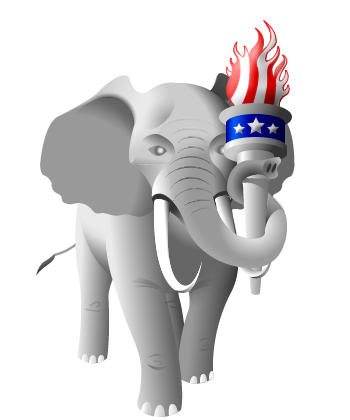by Bay Buchanan
Sent to me by By Minnesota Republican, Representative Mark Buesgens
Between the town hall meetings and the tea party rallies, millions
of Americans are taking to the streets to protest a government gone
berserk. They are angry and determined to take their country back.
But there are snakes in the grass intent on using this movement to
return to power, not the people, but the Republican establishment.
If this happens we lose everything, including our country.
To succeed, the rebellion must produce candidates with fresh
faces--populists who share our outrage for the arrogance of
Washington, individuals who will fight for American workers and
American families. We need primaries to nominate candidates that
aren't owned by party leaders, powerful special interests, nor
Corporate America.
Last year, seventy-five percent of Americans believed the country
was headed in the wrong direction and they threw out the bums --
Republican bums. Obama and his comrades misinterpreted the victory,
believing it was all about them, and proceeded to impose a big
government leftist agenda on a conservative nation. Now voters are
ready to throw out this new set of bums.
Enter the Republican establishment. They sold this country out
when they were in power and can't ever be trusted again. But they
see an opening and are setting the stage for their own return. They
are handpicking candidates -- Bush-likes and Bush-lites -- to run
against conservatives in primaries. Many are retreads, all are
available for purchase. Then the party elite endorses their
candidate early in the primary, fills their coffers with millions
from corporate PACs and special interests, pressures party regulars
to get in line, and sends word to the grassroots candidates:
"Drop out -- you can't win".
Their game plan: shut out the conservative populists. But if
candidates running for office because of love of country are
marginalized by the party elite, in favor of career politicians
beholden to party leaders, we are lost -- and so is America.
Look at the Senate races. The National Republican Senatorial
Committee (NRSC), led by Sen. John Cornyn, has already endorsed in
half a dozen Republican primaries, with more to come. Solid
conservatives with great credentials -- new faces, future leaders,
threats to the party elite -- were already announced candidates in
many of these races. But Cornyn and his cronies aren't about to let
the rank and file choose the candidates -- too risky. A man of the
people might slip through and too many of them could lead to
government by the people.
In Florida, the NRSC endorsed Gov. Charlie Crist, an Arlen Specter
Republican, who is running against a young conservative Cuban-
American Marco Rubio. Rubio was a long shot but the NRSC
endorsement so outraged conservatives nationwide it breathed new
life into his campaign.
In Colorado, District Attorney Ken Buck, a tough prosecutor of
illegal aliens, was gaining traction in his campaign for U.S.
Senate. Enter John McCain. He calls Jane Norton, former Lt
Governor and state chairman of his presidential bid, and convinces
her to run against Buck, promising the NRSC endorsement, plenty of
money, and a lock on the nomination. Le Moine Dowd, a grassroots
activist, summed it up perfectly: "Do we want the NRSC deciding our
candidate? Does this action by the NRSC make the primary election
irrelevant? Does it make the Colorado Republican Party irrelevant?"
In Ohio, Rob Portman, a former pro-amnesty congressman and Bush
trade rep, announced his bid for the U.S. Senate earlier this year.
Then Tom Ganley, a conservative businessman from Cleveland
infuriated by the massive uncontrolled spending of Washington,
decided to run. Mortal sin, declared the party, which told this
self-made successful businessman to get out of the race, that
"the U.S. Senate isn't an entrylevel position." The NRSC endorsed
Portman and are in full campaign mode. (Do these nitwits really
think one of the architects of the Bush policy that sent our jobs
overseas is going to win the general election in a state with 11%
unemployment?)
This same scenario is being repeated in a dozen other states. The
political bosses are adamant that our candidates look and talk like
them -- the kind that will get in line behind them. Leaders that
rise up out of the rebellion and run for office will be a problem
for them. So the snakes are out to stop them.
The rebellion must start to focus on producing candidates that will
do represent the American people in Washington -- then we must
rally behind them and defeat the establishment candidates in the
primaries. If that doesn't work, we must field candidates to run as
independents in the general. The country is too important to let the
establishment of either party continue to have their way with her.












